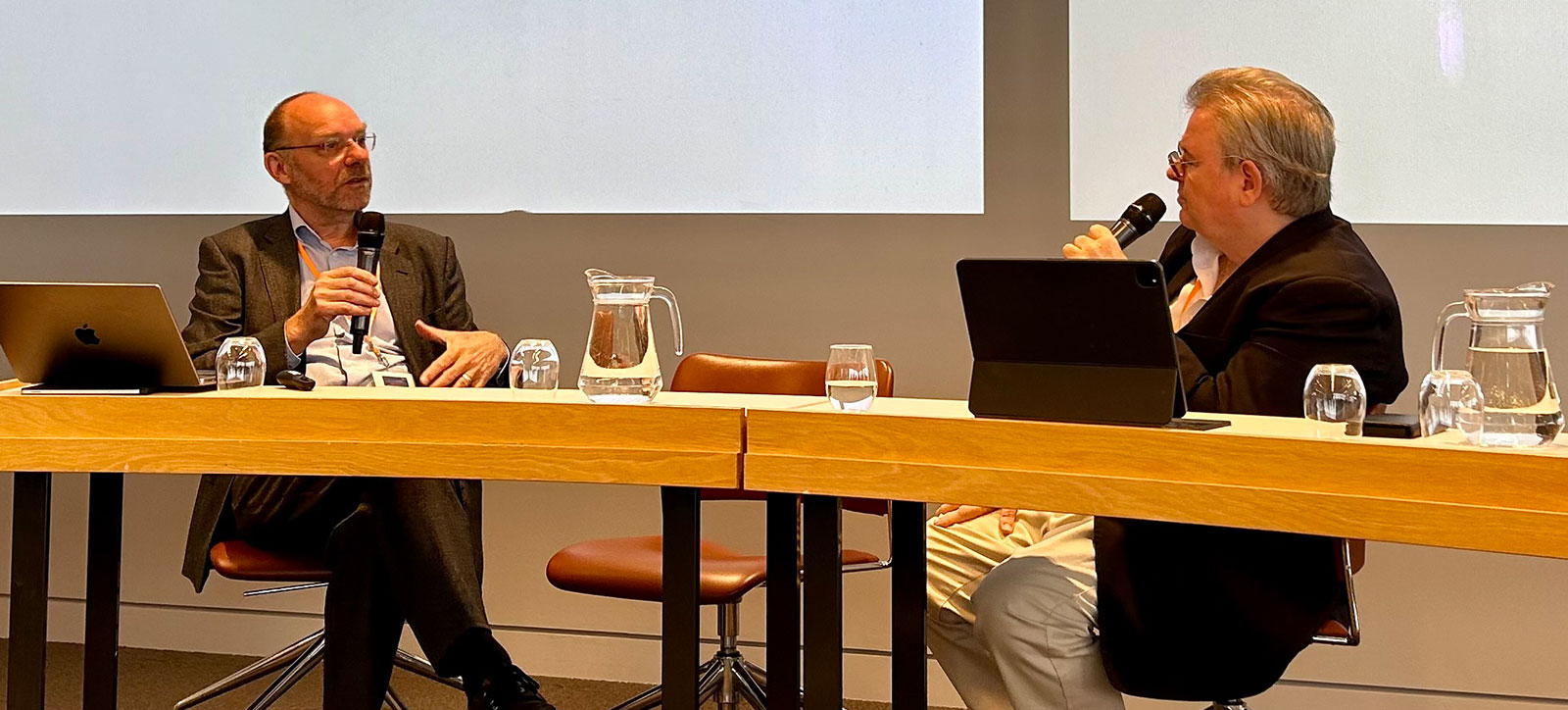
In conversation: Stephen Roper (left) and Mark Hart of the ERC outline the problems facing SMEs.
How to improve support for small firms in tough economic times was the focus of a conference led by Warwick Business School’s Enterprise Research Centre (ERC).
“There is an extensive suite of business support available. Yet, quite often, it is not cutting through,” said Stephen Roper, Professor of Enterprise and Director of the ERC, in his opening remarks to the State of Small Business Britain Conference 2024 at WBS London at The Shard.
“The UK is a great environment to start a business. However, fewer and fewer companies are scaling up. The needle is just not moving on overall growth and productivity at company level.”
“We are also seeing persistent declines in innovation rates, particularly product innovation among SMEs.”
The extent of the problems facing small and medium-sized enterprises (SMEs) was further outlined by two research presentations at the conference.
Karen Bonner, of Ulster University’s Economic Policy Centre, presented research carried out with Mark Hart of the ERC on the enduring productivity problem in the UK. This pointed to the fall in the rate of job re-allocation – a key measure of productivity – from 35 per cent in 1998 to 23 per cent in 2023.
“Business dynamism in the UK is clearly in long-term decline,” she said.
Meanwhile, Jun Du, of Aston Business School, said the flatlining of British exports to Europe in the four years since the post-Brexit Trade and Cooperation Agreement between the UK and the EU was having a clear effect on small business productivity.
“Micro and small firms are more impacted negatively by barriers to trade such as non-tariff measures, which affect export value and quantity,” the professor, who is an ERC project lead, said.
“SMEs, the backbone of the UK economy, are struggling to cope with the increased costs and complexities of new trade barriers.”
Against this backdrop, companies are finding it difficult to scale up. “There’s no such thing as a ‘high-growth firm’, a ‘scale-up’, anymore,” Dr Bonner said. “Only firms that have high-growth episodes.”
This point struck a chord with delegates at the conference. “That really resonated for me,” said Richard Jeffery of business support agency, The Growth Company. “We need to get better at identifying companies about to go through a growth episode so we can support them at that point. It was interesting to see data intelligence tools discussed at the conference. Tools like this could be a real game-changer.”
Advice and support for SMEs was firmly on the agenda of four panel discussions during the conference. On one of the panels, Kevin Mole, Associate Professor and a project lead with the ERC, pointed to “the fragmentation of business support” as a problem, with companies uncertain of where to go for advice.
On another panel, evidence-gathering to inform better business assistance at the local level was the focus.
The sharing of evidence was a key strength of the ERC conference, according to the Small Business Commissioner Liz Barclay. “If you don’t have the evidence, how can you say people will benefit from certain policies,” she said.
How small businesses struggle with late payments
Responsible for supporting small businesses in their struggles with unfavourable payment practices, she was particularly interested in the research of Dr Bonner which focused on small firms that had proved themselves to be the “productivity heroes” in recent years.
“But if these firms are not being paid in a quick and timely fashion, they will not be able to carry on investing, employing more people, and increasing their productivity,” she said.
“The payments issue really sits on small business growth and we need to get that message across, and we do that with more evidence.”
Evidence sharing was also important for Mr Jeffery. “The sort of insights that the ERC brings is a huge positive,” he said.
“This conference shows a huge passion about tackling some of the challenges we’ve got.”
He added: “I think business support can work really well at the local level but to really achieve things the system has to work in an integrated way at the regional and national levels too. The entire ecosystem must work together.”
The conference also heard about the experiences of small companies themselves in accessing support. In conversation with Professor Roper, Alan Lowry, of Environmental Street Furniture, gave the perspective of an exporting firm. In an afternoon presentation, Mike Nicholson, of Gripsure UK, spoke about the role of financial assistance in supporting his company’s business journey.
Stephen Roper is Professor of Enterprise and Director of the Enterprise Research Centre.
Mark Hart is Deputy Director of the Enterprise Research Centre.
Kevin Mole is Associate Professor (Reader) of Enterprise. He teaches Entrepreneurship and New Venture Creation on the Executive MBA (London) and the Global Online MBA (London).
Discover more articles on Digital Innovation and Entrepreneurship by subscribing to our free Core Insights newsletter.




 X
X Facebook
Facebook LinkedIn
LinkedIn YouTube
YouTube Instagram
Instagram Tiktok
Tiktok